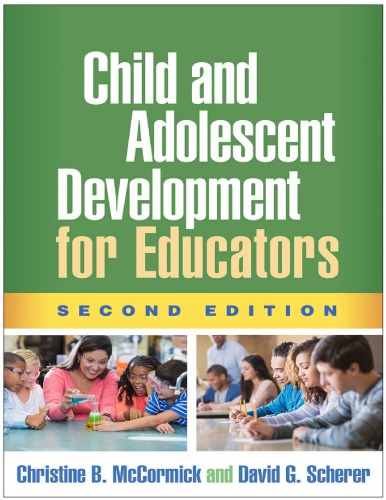

Most ebook files are in PDF format, so you can easily read them using various software such as Foxit Reader or directly on the Google Chrome browser.
Some ebook files are released by publishers in other formats such as .awz, .mobi, .epub, .fb2, etc. You may need to install specific software to read these formats on mobile/PC, such as Calibre.
Please read the tutorial at this link. https://ebooknice.com/page/post?id=faq
We offer FREE conversion to the popular formats you request; however, this may take some time. Therefore, right after payment, please email us, and we will try to provide the service as quickly as possible.
For some exceptional file formats or broken links (if any), please refrain from opening any disputes. Instead, email us first, and we will try to assist within a maximum of 6 hours.
EbookNice Team

Status:
Available0.0
0 reviews
ISBN 10: 146253483X
ISBN 13: 9781462534838
Author: Christine B McCormick, David G Scherer
This accessible text--now revised and updated--has given thousands of future educators a solid grounding in developmental science to inform their work in schools. The book reviews major theories of development and their impact on educational practice. Chapters examine how teaching and learning intersect with specific domains of child and adolescent development--language, intelligence and intellectual diversity, motivation, family and peer relationships, gender roles, and mental health. Pedagogical features include chapter summaries, definitions of key terms, and boxes addressing topics of special interest to educators. Instructors requesting a desk copy receive a supplemental test bank with objective test items and essay questions for each chapter. (First edition authors: Michael Pressley and Christine B. McCormick.) New to This Edition *Extensively revised to reflect a decade's worth of advances in developmental research, neuroscience, and genetics. *Greatly expanded coverage of family and peer relationships, with new content on social–emotional learning, social media, child care, and early intervention. *Discussions of executive function, theory of mind, and teacher–student relationships. *Increased attention to ethnic–racial, gender, and LGBT identity development. *Many new and revised practical examples and topic boxes.
PART I Theoretical Perspectives in Child Development
CHAPTER 1 Introduction to Child Development and Education
The Evolution of Developmental Science
Research Methods in Child Development and Education
Review of Key Terms
CHAPTER 2 Biological Development
Foundations of Neurological Development
Patterns of Physical and Motor Development
Biological Determination of Individual Differences: The Example of Intelligence
Disruptions of Normal Biological Development
Some Unique Aspects of Development Relevant to Educators
Biological Foundations of Academic Competence
Chapter Summary and Evaluation
Review of Key Terms
CHAPTER 3 Cognitive Development: Piaget’s Stage Theory
Piaget’s Four-Stage Theory
Neo-Piagetian Perspectives on Development
Moral Judgment: An Approach in the Tradition of Piaget
Constructivist Approaches to Education
Chapter Summary and Evaluation
Review of Key Terms
CHAPTER 4 Cognitive Development: Information-Processing Theory
Basic Cognitive Capacities
Strategies
Knowledge Representation
Chapter Summary and Evaluation
Review of Key Terms
CHAPTER 5 Social Theories of Development and Learning
Social Learning Theory
Development According to Freud: The Psychosexual Stage Theory
Development According to Erikson: The Psychosocial Stage Theory
Chapter Summary and Evaluation
Review of Key Terms
CHAPTER 6 Sociocultural Theories of Development and Education
Vygotsky’s Sociocultural Approaches to Mind
Cultural Differences and Their Implications for Classroom Practice
Cross-Cultural Insights about the Effects of Schooling on Cognitive Development
Chapter Summary and Evaluation
Review of Key Terms
PART II Key Topics in Child Development and Education
CHAPTER 7 Language Development and Linguistic Diversity
Biological Foundations of Language
Language Acquisition
Bilingualism
Deafness
Chapter Summary and Evaluation
Review of Key Terms
CHAPTER 8 Intelligence and Individual Differences in Academic Competence
Standardized Tests
The Nature of Intelligence
Bias in Mental Testing
Learner Diversity
Chapter Summary and Evaluation
Review of Key Terms
CHAPTER 9 The Development of Academic Motivation
Why Might Academic Motivation Decline with Increasing Grade in School?
How Can Motivation Be Supported and Encouraged in School?
Contextual Determination of Academic Motivation
Chapter Summary and Evaluation
Review of Key Terms
CHAPTER 10 Family and Peer Relationships
The Child’s First Relationship: Adult–Infant Attachment
How Does Day Care Affect Child Development?
Family Factors That Influence Child Development
Beyond the Family: Peer Relationships
How Do Social Relationships Affect Academic Achievement?
Chapter Summary and Evaluation
Review of Key Terms
CHAPTER 11 Gender Role Development
Gender Identity
Theoretical Explanations of Gender Development
Gender Differences
Gender Differences in Educational Contexts
Chapter Summary and Evaluation
Review of Key Terms
CHAPTER 12 Recognizing and Understanding Student Mental Health Problems
Themes to Keep in Mind
Psychological Problems Often First Detected in Early Childhood
Psychological Problems Present during the Elementary School Years
Psychological Problems That Are Prevalent during Adolescence
Chapter Summary and Evaluation
Review of Key Terms
CHAPTER 13 Integrative Review of Major Concepts
The Major Periods of Development
Mechanisms of Development and the Determinants of Individual Differences
Summary and Concluding Comments
References
Index
About Guilford Press
Discover Related Guilford Books
child and adolescent development for educators ebook
child and adolescent development - educational context
child development and education 7th edition ebook
child development and education 6th edition pdf
child development and education 6th edition pdf free
child development and education (5th edition pdf free)
Tags: Christine B McCormick, David G Scherer, Child, Adolescent